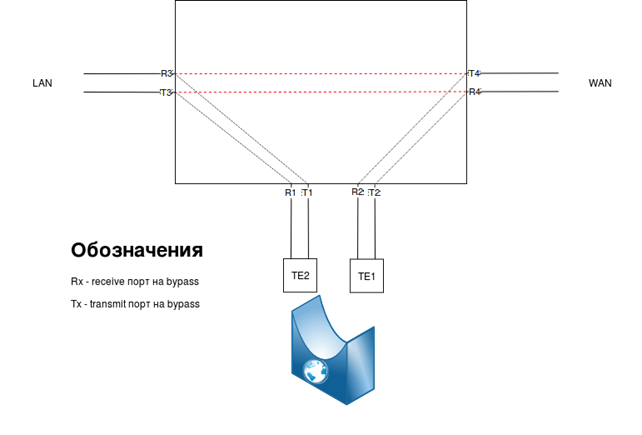Configuring the EcoBypass connection EcoNAT Documentation / Quick system start / Configuring the EcoBypass connection
The EcoNAT device can be connected to the network via the active optical bypass of the EcoBypass series. Interaction with EcoBypass is carried out by sending heartbeat messages by UDP. In the event that heartbeat messages cease to arrive, EcoBypass switches to transparent mode. After that traffic is bypassed by EcoNAT until communication with it is resumed.
For the correct operation of this scheme, the IP connection between the EcoNAT MNG interface and the EcoBypass ETH interface must be configured. In turn, pairs of EcoNAT interfaces are connected to the paired optical ports EcoBypass.
The connection scheme for a pair of TE1, TE2 network interfaces via EcoBypass is shown in the figure below.

Hearbeat messages have the form <BP01_XX_BP>, where XX is the number of the EcoBypass network card to which the EcoNAT device is connected. In response, EcoBypass sends messages like <BP01_XX_BP_OK>.
Heartbeat messages are always sent, unless one of the pair interfaces has been administratively turned off, or the device has malfunctioned.
In addition to the total absence of heartbeat messages, EcoBypass can monitor the drop in the Tx signal level from the device. At a critical drop in the level, EcoBypass switches to transparent mode.
EcoBypass is configured in the system bypass branch of the configuration tree.
The parameters configured in this branch are shown in the table below.
Parameter | Description |
|---|---|
enable/disable | Enable/disable sending heartbeat messages to EcoBypass |
bypass_ip | IP address of EcoBypass. For proper operation, the IP connection between the EcoNAT MNG interface and the EcoBypass ETH interface must be configured |
bypass_tos | The value of the Type of Service (ToS) field for sent messages. Possible values are from 0 to 255 (0 by default) |
bypass_interval | Interval for sending heartbeat messages to EcoBypass. Set in milliseconds. Possible values are from 1 to 2000 (10 by default) |
teN1_teN2 | Setting for a pair of interfaces.
In the case of the 1U EcoBypass model, the numbering of the slots will be from 1 to 8. |
Setting example:
EcoNAT:2:system.bypass> ls
enable
bypass_ip 10.210.1.199
bypass_tos 0
bypass_interval 10
te1_te2 disabled
te3_te4 disabled
te5_te6 1
te7_te8 2
te9_te10 3
te11_te12 4
te13_te14 disabled
te15_te16 disabled
EcoNAT:3:system.bypass>





